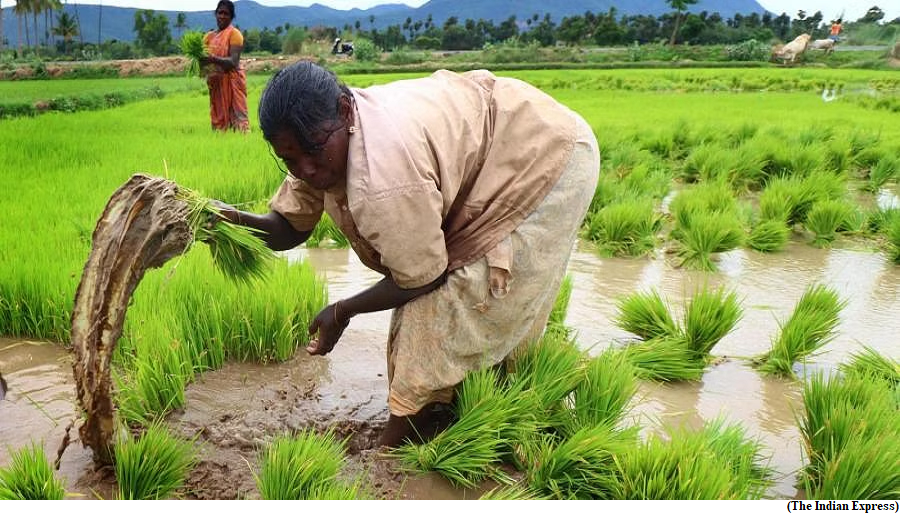Climate change and women in agriculture, Navigating challenges and fostering resilience (GS Paper 3, Environment)

Context:
- Climate change, marked by rising temperatures, altered weather patterns, and intensified extreme events, imperils diverse sectors, none more than agriculture.
- As these effects escalate, it becomes crucial to examine its impact on marginalized groups, particularly women in agriculture.
Details:
- Climate change‘s roots lie in anthropogenic greenhouse gas emissions from activities such as fossil fuel combustion and deforestation.
- Its far-reaching effects disrupt ecosystems, with agriculture being especially vulnerable.
- Altered precipitation patterns, shifting growing seasons, and increased extreme weather events challenge established farming practices and livelihoods.
Role of women:
- Women constitute a significant force in global agriculture, accounting for around 43 percent of agricultural laborers. In countries like India, where subsistence farming is prominent, women constitute 33 percent of the workforce and nearly half of self-employed farmers. Their roles span from crop cultivation and livestock rearing to food processing and marketing.
- Despite these vital contributions, women grapple with barriers such as cultural norms, limited resource access, and unequal decision-making power.
Impacts of climate change:
- Changing weather patterns and extreme events deeply impact women’s roles in agriculture. Variability in rainfall and prolonged droughts lead to reduced crop yields, jeopardizing food security for farming-dependent households.
- Floods and extreme weather events can devastate crops and infrastructure, compelling women to prioritize family care and alternative income generation.
- This potential shift away from farming can contribute to decreased agricultural productivity, as women have traditionally been integral to on-farm operations.
Economic implications:
- The economic implications of climate change for women in agriculture are substantial.
- Diminished crop yields translate to reduced incomes, further exacerbating existing gender inequalities.
- Cultural norms and discriminatory practices hinder women’s access to land ownership, a critical asset in agriculture.
- Women’s lack of control over assets restricts their access to credit, loans, and insurance, rendering them vulnerable to climate-induced losses.
- Water scarcity, a climate change consequence, disproportionately affects women who often bear the responsibility of water collection.
Cultural impacts on gender roles
- Climate change also influences cultural dynamics and gender roles within agricultural communities.
- Women’s expanded responsibilities can challenge traditional norms, leading to shifts in perceptions of their roles.
Adaptive strategies:
- To navigate climate-related challenges, women farmers adopt adaptive strategies, including income diversification and cultivating climate-resilient crops.
- These strategies enhance their resilience in the face of the evolving agricultural landscape.
Gender-responsive policies:
- Recognizing women’s unique challenges in agriculture, gender-responsive policies are pivotal for effective adaptation.
- Governments and organizations must ensure equal resource access, credit availability, and decision-making power for women.
- Land tenure reforms that prioritize women’s rights and insurance mechanisms tailored to their needs can bolster resilience against climate-induced risks.
Way Forward:
- In conclusion, the intricate relationship between climate change and women in agriculture demands a comprehensive approach to adaptation.
- Women’s vulnerabilities underscore the need to address their specific challenges. By prioritizing the needs of women in agriculture, policies can empower them to continue their vital contributions to food security and sustainability.
- Climate change necessitates collaborative action, and through gender-responsive policies, we can shape an equitable and resilient future.


